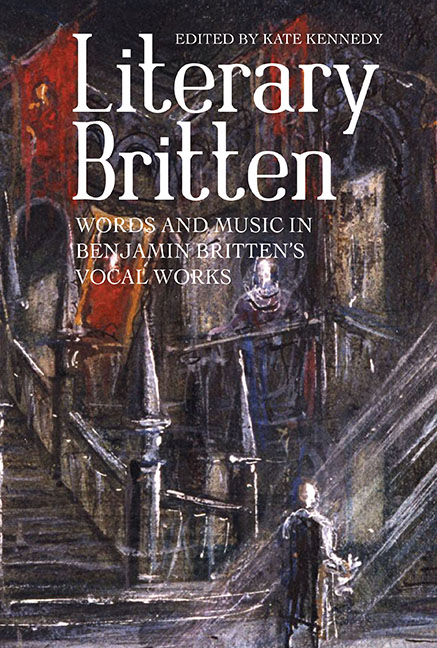Book contents
- Frontmatter
- Contents
- List of Illustrations
- List of Music Examples
- List of Contributors
- Introduction
- Part I Perspectives
- Part II Studies
- 9 Settings from Boyhood
- 10 ‘Practical Jokes’: Britten and Auden's Our Hunting Fathers Revisited
- 11 Choice and Inevitability: The Moral Economy of Peter Grimes
- 12 Sin, Death and Love: Britten's The Holy Sonnets of John Donne
- 13 Britten's Donne Meditation
- 14 Scenes from Britten's Spring Symphony
- 15 ‘I have read Billy Budd’: The Forster–Britten Reading(s) of Melville
- 16 Miles Must Die: Ideological Uses of ‘Innocence’ in Britten's The Turn of the Screw
- 17 Benjamin Britten and Medieval Drama at Chester: From Abraham and Isaac to ‘The Nativity’
- 18 Ambiguous Venice
- Bibliography
- Index
12 - Sin, Death and Love: Britten's The Holy Sonnets of John Donne
from Part II - Studies
Published online by Cambridge University Press: 17 July 2019
- Frontmatter
- Contents
- List of Illustrations
- List of Music Examples
- List of Contributors
- Introduction
- Part I Perspectives
- Part II Studies
- 9 Settings from Boyhood
- 10 ‘Practical Jokes’: Britten and Auden's Our Hunting Fathers Revisited
- 11 Choice and Inevitability: The Moral Economy of Peter Grimes
- 12 Sin, Death and Love: Britten's The Holy Sonnets of John Donne
- 13 Britten's Donne Meditation
- 14 Scenes from Britten's Spring Symphony
- 15 ‘I have read Billy Budd’: The Forster–Britten Reading(s) of Melville
- 16 Miles Must Die: Ideological Uses of ‘Innocence’ in Britten's The Turn of the Screw
- 17 Benjamin Britten and Medieval Drama at Chester: From Abraham and Isaac to ‘The Nativity’
- 18 Ambiguous Venice
- Bibliography
- Index
Summary
Given over to Death by Sin; rescued from Death by Love: these are the complementary polarities of Britten's Donne settings.
The Holy Sonnets of John Donne is a cycle of nine songs composed between 2 and 19 August 1945. Although Britten composed the songs quickly, he had apparently been contemplating setting the Holy Sonnets for some time. Peter Pears first mentions reading the poems with him in February 1943; he raised the possibility of Britten setting them in August 1944. The songs were written immediately after Britten returned from a concert tour of Nazi concentration camps with Yehudi Menuhin. Britten deliberately chose to put himself in the way of this experience, which was evidently likely to be traumatic: he replaced the pianist originally engaged for the tour at his own request. For obvious reasons of sexuality and ethnicity, he must have reflected that, in other circumstances, he and Menuhin might both have been in the camps. After Britten's death, Pears reported how shocking the experience had been to Britten, and that it coloured everything he wrote subsequently.
Listening for the colouration of that experience in the music Britten wrote immediately, we might hear it as sympathy with the victims and horror of the wickedness of those who inflict suffering, repudiated as alien to oneself. Or we might hear it as a new and shocking sense of the possibilities of wickedness that bears on who oneself might be, unknown to oneself and in other circumstances. Insofar as we hear Britten's experience of the camps in these songs, Donne's poems, largely concerned with the poet's own sinful nature and the need for penitence, are more congruent with the second reflection. So too is the exclamation Britten placed at the opening as a keynote for the sequence: ‘Oh my blacke Soule!’. Both Britten and Pears described the subject of the cycle as death, Britten connecting this with his experience of the camps. Clearly death is a subject. Even more important in the cycle overall – as suggested by the cover illustration of the first publication, El Greco's ‘Saint Peter Penitent’ – is this general effect of sin: separating the sinner from God. Complementary to this, given a central position in the cycle by the placing and treatment of a sonnet on the death of Donne's wife, Anne, is the effect of love: bringing the sinner to God.
- Type
- Chapter
- Information
- Literary Brittenwords and music in benjamin britten's vocal works the boydell, pp. 243 - 255Publisher: Boydell & BrewerPrint publication year: 2018



